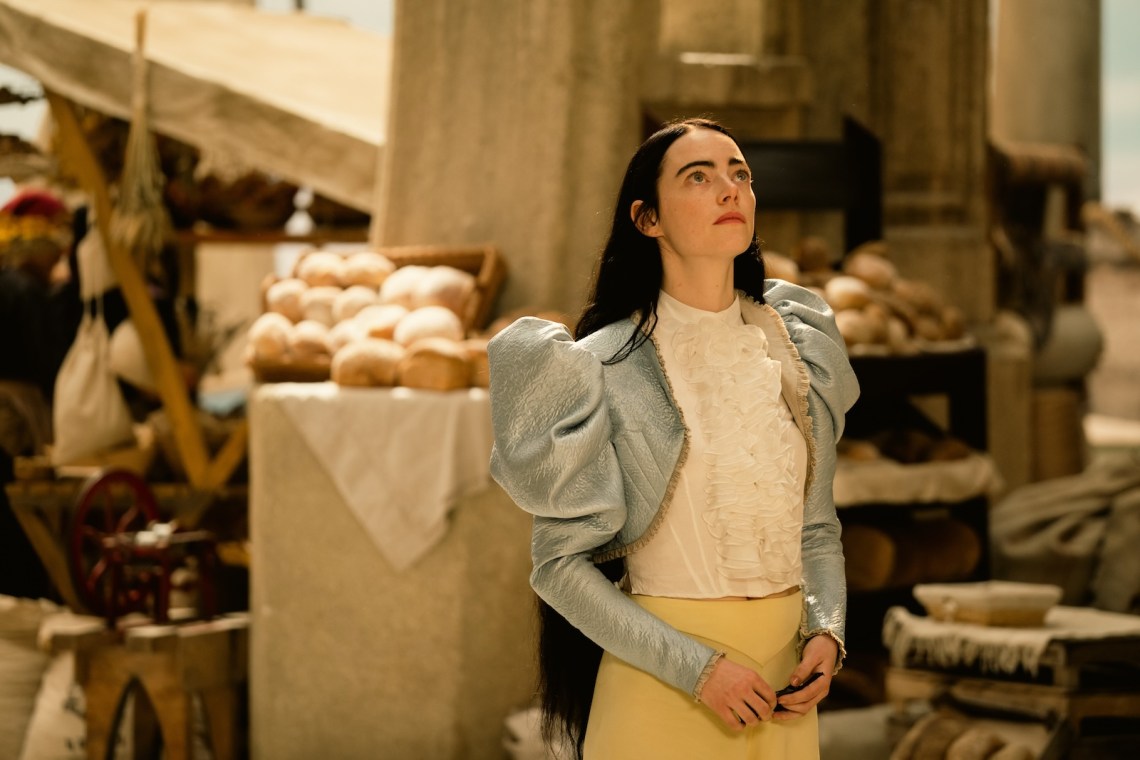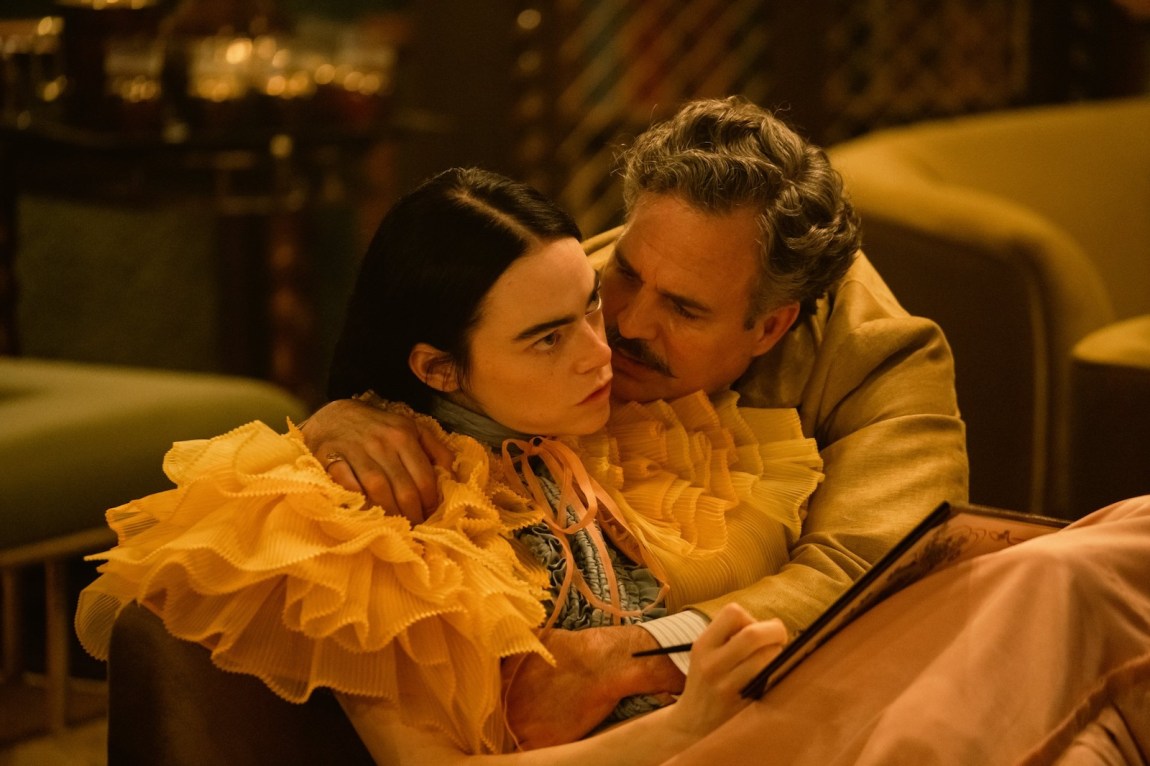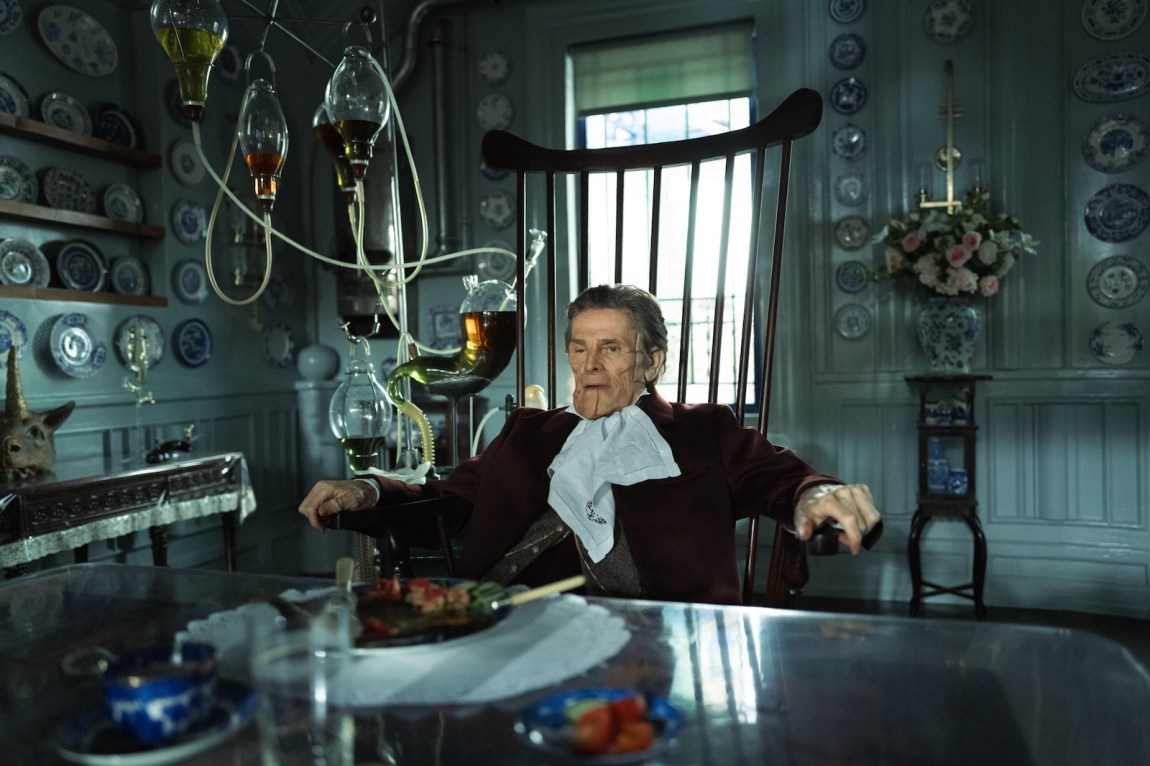When we first meet Bella Baxter (Emma Stone), the heroine of Yorgos Lanthimos’s Poor Things, she walks stiffly, like a wind-up toy winding down, and is still learning to use a fork. Her hair is black as a crow’s and reaches down to her waist. She speaks a little, saying “wee” when she urinates (as she does, suddenly, in the hallway), but her mouth is still finding its way around words. She gleefully stabs out the eyes of cadavers, rides a bicycle indoors, and hits strangers in the face by way of greeting—just the one stranger, actually, since almost no one is allowed to enter the house. Some liquid trickles out of his nose; “bud,” she says, happily, before being reminded that the correct pronunciation is blud.
The house and adjoining laboratory are run by one Godwin Baxter (the impeccable Willem Dafoe), a scarred, somewhat unconventional scientist—you would call him “mad”; Bella calls him “God”—and the stranger is Max McCandles (a sympathetic Ramy Youssef), a gentle and poor student who attends God’s lectures at the medical school. After insulting his most recent paper, God invites Max to observe and take notes on Bella’s progress. Max dutifully records how quickly her hair grows (an inch every two days) and tries to track how many peanuts she stuffs in her mouth at snacktime, but eventually he demands an explanation for this “very pretty retard.” God shows him the diagrams. It was all so simple. He created Bella by transplanting the brain of her unborn fetus into her body, which he discovered on a riverbank after she threw herself from a bridge. Cue flashback: a head sliced open; the gooey organ popped out. Bolts of electricity, sharp blue eyes fluttering open. It’s a monster movie!
It’s also a romp. Emma Stone’s performance is dazzling, but all the actors—chief among them Mark Ruffalo, who plays a ridiculous Lothario who, in Bella, finds more than he can handle—appear to be having the time of their lives. A fishbowl lens warps and distorts the frame, while the palette progresses from rich black and white to lurid color. Jerskin Fendrix’s discordant soundtrack is like an untuned angel’s harp, minor plucks followed by choral shrieks.
The world of Poor Things is a baroque, futuristic nineteenth century; the wealthy travel by carriages and ornate steamships while trams dangle from wires in the sky. The sets are fanciful rip-offs—but such good rip-offs—of Terry Gilliam. Bella is extravagantly costumed to take up the maximum amount of space. She wears bolero jackets, ruffly blouses, sheer skirts, and futuristic evening dresses, always accented with enormously puffed sleeves. The word “balloon” would not do her sleeves justice. They are airships, zeppelins of fabric, fanciful and architectural, that make her seem regal and alien and like a child playing dress-up. It’s like she’s constantly walking around with a wedding cake whorled around her shoulders.
The source material, a 1992 novel by Alasdair Gray, is a mashup of literary techniques: letters, diaries, memoir. The whole package is framed as the young medical student’s story, discovered by a curatorial assistant working to preserve Glasgow’s history, and challenged by a letter from his wife, Victoria, denying everything. Lanthimos relocates Godwin’s manse from Glasgow to London, doing away with the novel’s vested interest in Scotland as a site of medical (and literary) innovation. (He also changes some of the names, for reasons seemingly designed to confuse a reviewer: Archie McCandless becomes Max McCandles; Aubrey Blessington becomes Alfie.) In the novel, Bella is not quite the focus—it’s the cacophony of voices, the dissonance of perspectives, and the texture of language that interest Gray. The “monster” is the form of the novel itself, and the story is sutured together roughly, so that we notice the seams.
Cinema makes Bella something other than a linguistic curiosity. Our attention is focused on the body—Emma Stone’s actual body. What she does as Bella is nothing short of alchemy. She is all limbs, quivering with an organic electricity. The way she walks, her ramrod posture, her sloppy eating, her wild dancing—it’s all magnificently choreographed. The story requires her to be naked and sexual, and Stone is fearless and magnetic in this regard. On her pale, pointy face, where two thick, dark eyebrows inch in half-moon paths toward her nose, is the sheer joy of mayhem and the guileless delight of discovery. Stone has a gift for showing thinking on her face, also on display in Lanthimos’s previous film, The Favourite (2018), in which she played a cunning maid who becomes Queen Anne’s pet at court.1 In Poor Things, information dawns on Bella like sunrise; you see her learning, recalibrating, adjusting.
Advertisement
*
As children will do, Bella eventually demands to be taken outside to play. This is the inciting incident, the moment when all the trouble starts. God doesn’t want her to leave the house, but gives in to her tantrum. (She’s breaking the jars in the laboratory—I think they’re filled with fingers.) Everything is lovely until she wants to stop on the way back for ice cream. She thrashes and wails until God sedates her with a chloroform-soaked handkerchief; at home, the men undress her and put her to bed. The next morning, when she awakes naked, her hand finds its way between her legs. Presumably this is something she would have figured out eventually, but it’s significant that Poor Things pairs the discovery of sexual pleasure with Bella’s first trip into the world. Down at the breakfast table she tries it again with an apple, a cucumber. She wants to show everyone what she’s learned. Max and the maid inform her that such things aren’t done in polite society. They say “no” the way one says no to a dog.
Soon Bella and Max have fallen in love. When they become engaged, God wants them to sign a contract compelling them to live with him always. This requires him to retain the services of a lawyer, the rakish Duncan Wedderburn (Ruffalo), who meets and is quickly obsessed with Bella. Shortly thereafter, quivering with excitement, Bella dashes into the laboratory to inform God of her “secret” plan to abscond with Duncan. Max, despite Bella’s assurances that she will marry him when she returns, tries to stop her from leaving. She—a quick study—is prepared with a chloroform-soaked handkerchief of her own.
God isn’t so foolish. He sews some money into the lining of her coat and kisses her good-bye (“She is a being of free will,” he later informs Max in his gravelly voice.) While adventuring abroad, Bella changes. She walks with a more even gait. Her vocabulary improves, and she learns to say “I” instead of referring to herself in the third person. But these are surface changes. Her fierce desire to be free and to experience the world is constant. What she learns surprises her. People do not pursue what feels good. They are hypocrites who make strange compromises. They are jealous and controlling and look with resignation on the plight of others. At first these revelations inspire the righteous fury of adolescence. Later in the film, when she is exhausted by it all, a madam at a Parisian brothel gives her some advice: we have to experience not just the good in the world, this crone says, but the degradation and the sadness, too. That’s how we become real people, whole people—“people of substance.”
This could be Lanthimos’s artist statement. He has always worked in the terrain of dark humor and psychological horror. His films have often set up absurd or dystopian situations and then painstakingly followed them to their tragic ends. He has explored how people are deformed or destroyed by systems—small as a family, large as a state—of power and control. And yet despite the madam’s stirring words, the glimpses of degradation, sadness, or violence in Poor Things are few. The sadism is nasty but fleeting. The bloody stuff is not scary. The only bodies that get stabbed in the eye are already dead. In Lanthimos’s previous films, desire was dangerous; it made characters vulnerable and exposed them to manipulation or painful injury. But Bella’s innocence is like a magic talisman that protects her, gives her strength.
Ultimately, all the trappings of fantasy in Poor Things—the costumes, the sets, the Frankenstein creation scene—only serve the film’s central fantasy, which is a world in which a young woman can pursue pleasure and knowledge and emerge from the experiment unscathed. Bella gets falling-down drunk in a bar alone but is not raped; while doing sex work, both for money and to broaden her scope of sexual experience, she is not assaulted by her clients. Men are confounded by her but they do not abuse her. She is taken advantage of once, when her money is stolen, but she doesn’t even know that it happened. When a real threat finally arrives, she escapes without much fuss. I doubt I have ever seen a character onscreen who wants as much as she does, with as much determination and force and as little comeuppance. She can’t get enough of anything: of orgasms, of exploration, of new ideas. She is expansive, wanting only to grow, improve, amass, increase; taste more, do more, feel more, see more.
Advertisement
The comedy of Poor Things plays on the distance between Bella’s innocence and the world’s—the viewer’s—cynicism. It’s pretty clear that the monster in this movie isn’t Bella; it’s “polite society.” This is a monster that can be slayed, Lanthimos informs us, by the right heroine. But how did Bella get to be so free and forward-thinking? Nurture alone can’t explain it. After she leaves for adventures abroad, God and Max try to repeat the transplant procedure on a girl they call Felicity. The results are dim. Not just any baby’s brain will produce a creature this bold, interesting, and horny.
*
Bella has no memories of her past life. (God tells her that her parents were explorers who perished in the wilds of South America.) Unlike most reincarnation stories, which preserve the spirit and dispense with the body, in Poor Things it’s the body that provides continuity to the past.
It’s possible to read Bella’s creation in light of abortion politics—possible, but incoherent. One might want to say that God the father kills the baby and resurrects the mother—a pro-choice fairy tale! But one might just as easily say that the mother dies so the child might live. At the very least, the mother has lost her identity, no longer recognizes the life she led before. Her brain—repository of painful memories, possibly hard-won insights—is disposed of, while her body is deemed worth saving. In the novel, when McCandless asks Baxter if he considered saving the baby, who was so close to term, Baxter answers, “Of course I saved it—the thinking part of it.” The operation, in other words, reverses the terms of birth, fusing one being from two. Two die so that one may live. To say Bella is the mother or the child makes no sense. She is both, and neither. She is a fresh start.
It’s difficult to untangle what Poor Things is saying about desire and the body and the mind. We eventually learn that Bella’s sexual voraciousness was a problem in her previous marriage, which would suggest that the origin of desire is somehow in the body—even in the clitoris itself. This makes no sense, obviously, but neither did the set-up for Lanthimos’s The Lobster (2015), in which people who couldn’t find romantic partners were transformed into animals. Bella was raised in a culture of science rather than of shame, but so was stupid Felicity. Perhaps some inherited sexual compulsion connects mother and child. Perhaps Bella’s baby brain is the future bursting through ahead of its time. Or perhaps Bella’s intelligence—her brilliance—first expresses itself sexually, and only later in thinking. Perhaps the point is that sexual desire is a form of questing, a way of doing philosophy and science. She is a scientist and empiricist like God, but also a transcendentalist like Emerson, whom she reads on a cruise ship; her laboratory is her own body and mind.
In Gray’s novel, Bella understands her urge to leave with Duncan as the only way to fill in her biographical blanks. “I need more past,” she says. “Duncan will give me a lot of past fast. Duncan is quick.” Experience in both senses, then: the momentary, fleeting event, and the wisdom that one gains over time. Sex as the route to knowledge, how one acquires a backstory. But as the lure of Emerson, Goethe, Spinoza, and socialism grows stronger, the notion of “experience” broadens—ideas interest her as much as sensations. She has enough past; she can now use her time to read.
In Gray’s novel Baxter calls himself a “murderer,” saying that he stole eighteen years from the baby’s life by putting its brain into the woman’s body, blaming his “damnable sexual appetite.” But in Lanthimos’s version, God couldn’t fuck her if he wanted to. He can’t even digest food without the aid of a bubbling mobile laboratory. He is himself a kind of creature, who was cruelly experimented on by his father, a surgeon who founded the medical school—a genius ahead of his time, who took empiricism and a lack of feeling to sadistic ends. God was abused as a little boy and grew into a man committed to understanding that abuse as genius, done in the spirit of discovery. Bella was born—as we all are—under terms she did not choose or consent to. A pure product of science, she can only continue the work. When Bella decides that she, too, will become a doctor, it’s a moment of feel-good triumph that also suggests traumatic repetition.
Lanthimos has grown joyful in his middle age. The Favourite and now Poor Things are complex and brilliant and dark but undeniably more fun than his earlier work, which evoked fear, even terror, and shock. Bella may shock Duncan Weddeburn, but she will only delight the viewer. There is, however, a turn at the end that makes her more recognizably Lanthimosian. Whether it’s the parents in Dogtooth constructing an alternate reality for their isolated children, the regimes of loneliness and enforced intimacy that govern The Lobster, or the court politics of The Favourite, Lanthimos’s subject has always been power games. Bella resists for a long time, but ultimately the world teaches her that these games are too fun to sit out.






